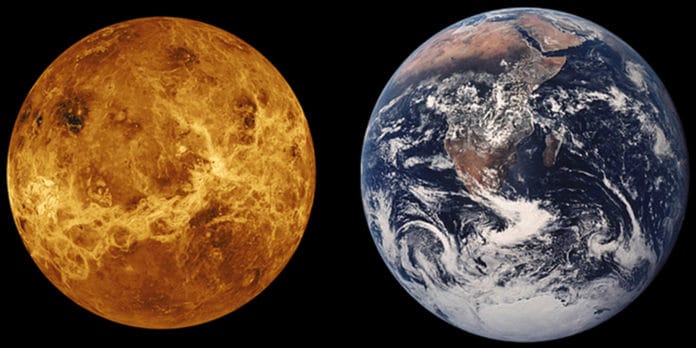Planet Earth has been called the “Blue Planet” due to the abundant water on its surface. Because of the significance of water to continue life, the subject of the origin of water on Earth is primordial. A significant challenge in examining this question is that Earth has lost all the hints of its origin since it is an active planet.
A team of numerical modelers and geochemists led by Cédric Gillmann – Université libre de Bruxelles, ULB shed light on this question. As Earth lost all the traces of its formation, the team thus decided to look far beyond the Earth, i.e., Venus, to investigate the origin of terrestrial water.
The respective geological and climatic evolutions of planets Earth and Venus diverged dramatically in the past. This leads to Venus’ present-day 92 bar atmosphere heated by an infernal greenhouse up to 470°C, as opposed to the mild conditions and only 1 bar pressure at the surface of Earth.
As Venus doesn’t have plate tectonics, Venus’ volcanic activity and outgassing are reduced. But, it has a stagnant lid instead.
Despite being an inferno, the evolution of the atmosphere of Venus is easy to comprehend and model over geological times. Likewise, because of their proximity, the Earth and Venus ought to have received a similar kind of material during their history. All these factors consolidate to make Venus an ideal spot to consider the first evolution of terrestrial planets.
During their study, scientists used numerical simulations of impacts of different types of asteroids containing various amounts of water. They found that water-rich asteroids colliding with Venus and releasing their water as vapor cannot explain the composition of Venus’s atmosphere as we measure it today.
Meanwhile, an asteroid comes to Venus and Earth as well. Afterward, the giant impact must have been dry, and it prevents the replenishment of the Earth in water.
It suggests that the water is available since its formation, likely buried deep in the Earth so it could survive the giant impact.
Scientists noted, “This idea has profound implications in terms of habitability of ancient Earth, Venus, and Mars, as it suggests that planets likely formed with their near-full budget in water, and slowly lost it with time. Because Mars is much smaller, it likely lost all its water while life developed on Earth.”
“For Venus, those results shine a complimentary light on recent work advocating that water oceans existed at the surface of the planet and helped constrain the maximum amount of water that can be expected on Venus. They will also help prepare the next generation of space missions to Venus.”
